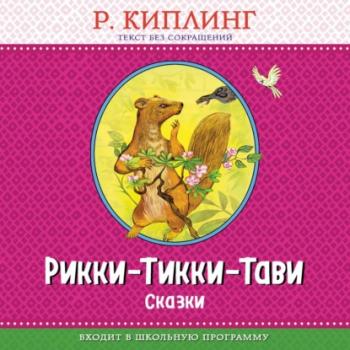ТОП просматриваемых книг сайта:















Редьярд Джозеф Киплинг
Список книг автора Редьярд Джозеф КиплингАннотация
Аннотация
Имя знаменитого английского писателя Редьярда Киплинга связывают прежде всего с историей о Маугли – мальчике, выросшем в стае волков. Однако из-под его пера вышло также немало сказок, главными героями которых частенько становились животные. В данный сборник вошли такие знаменитые произведения, как: «Кошка, которая гуляла сама по себе», «Рикки-Тикки-Тави», «Как у слона появился хобот», «Как леопард стал пятнистым» и т.д. Текст сказок сопровождается упражнениями, комментариями и словарем.
Книга предназначена для тех, кто только начинает изучение английского языка (уровень 1 – Elementary).
В формате PDF A4 сохранен издательский макет книги.
Аннотация
В книгу сказок известного английского писателя Редьярда Киплинга вошли произведения из его сказочного цикла «Сказки просто так» – о том, как мотылек топнул ногой, откуда у слона хобот, как появились броненосцы, и кто написал первое письмо и, конечно, о храбром мангусте Рикки-Тикки-Тави, спасшем людей от змей. Это произведение из списка школьной программы с полным, без сокращений, классическим текстом для младшего школьного возраста.
Информация о книге
Автор произведения Редьярд Джозеф Киплинг
Жанр Сказки
Серия Классика в школе (Эксмо)
Аннотация
«Здесь будет рассказана история одного неудавшегося предприятия, история, весьма поучительная для молодого поколения, по мнению женщины, потерпевшей неудачу. Конечно, молодое поколение не нуждается в поучениях и всегда более склонно поучать, чем учиться. Тем не менее мы приступим к описанию того, что произошло в Симле, т. е. там, где все начинается и многое кончается весьма плачевно…»
Аннотация
«Ему не было еще тридцати лет, когда он убедился, что нет человека, который понимал бы его. Несмотря на богатство, накопленное тремя трудовыми поколениями, несмотря на его просвещенный и правоверный вкус во всем, что касалось книг, переплетов, ковров, мечей, бронзы, лакированных вещей, картин, гравюр, статуй, лошадей, оранжерей, общественное мнение его страны интересовалось вопросом, почему он не ходит ежедневно в контору, как его отец…»
Аннотация
«Согласно обычаям Вермонта, воскресенье после полудня на ферме посвящается раздаче соли скоту, и, за редкими исключениями, мы сами занимаемся этим делом. Прежде всего угощают Дева и Пета, рыжих быков; они остаются на лугу вблизи дома, готовые для работы в понедельник. Потом идут коровы с Паном, теленком, который давно должен был бы превратиться в телятину, но остался жив, благодаря своим манерам, и, наконец, угощаются лошади, разбросанные на семидесяти ярдах заднего пастбища…»
Аннотация
«– В этой истории речь не коснется ни обезьян, ни дьяволов, – понизив голос, продолжал сэр Ричард. – Я расскажу вам о Жильбере Орлином, о рыцаре, отважнее, искуснее или смелее которого никогда не бывало на свете. И запомните, в те времена он был уже стар, очень стар…»
Аннотация
«Все двенадцать имели полное право гордиться и вместе с тем бояться; хотя на турнире они и выигрывали игру за игрой в поло, но в этот день они должны были встретиться в финальном матче с командой „архангелов“, а противники эти играли с полудюжиной пони на каждого. Игра должна была быть разделена на шесть партий, с перерывами по восьми минут после каждого часа. Это означало, что у „них“ будет по свежему пони после каждого перерыва. Команда же скидаров могла выставить по свежему пони только через два перерыва; а два на один – шансы неравные. К тому же, как указал Шираз, серый сирийский пони, им придётся бороться с самым цветом поло – пони Верхней Индии, пони, каждый из которых стоит по тысяче рупий, тогда как сами они дешёвки, набранные большей частью из деревенских, возящих телеги пони, хозяева которых принадлежат к туземному бедному, но честному полку…»
Аннотация
«Комната стала голубой от дыма трех трубок и сигары. В Индии начался сезон отпусков, и первым плодом его по эту сторону канала был „Тик“ Буало из 45-го бенгальского кавалерийского полка, который зашёл ко мне после трехлетнего отсутствия поболтать обо всем, что случилось с нами за это время. Судьба, которая отлично все устраивает, послала на ту же самую лестницу и в тот же самый час Инфанта, только что приехавшего из Верхней Бирмы, и они, взглянув вместе с Буало из моего окна, увидели шедшего по улице Невина, служившего незадолго перед тем в полку гурков, который участвовал в экспедиции в Чёрные Горы…»
Информация о книге
Автор произведения Редьярд Джозеф Киплинг
Жанр Зарубежная классика
Серия Сталки и компания
Аннотация
«По его невоспроизводимой манере произносить букву „р“ я узнал в нем уроженца Нью-Йорка; а когда он во время нашего длинного, медленного пути к западу от Ватерлоо стал распространяться о красоте своего города, я, объявив, что ничего не знаю об этом городе, не сказал больше ни слова. Удивлённый и восхищённый вежливостью лондонского носильщика, незнакомец дал ему шиллинг за то, что он пронёс его мешок на расстоянии около пятидесяти ярдов; ньюйоркец подробно осмотрел уборную первого класса, которой лондонская и юго-западная дороги дозволяют иногда пользоваться бесплатно; потом с чувством страха, смешанного с презрением, но сильно заинтересованный, стал смотреть в окно на аккуратненький английский пейзаж, словно погруженный в воскресный покой. Я наблюдал, как выражение удивления постепенно усиливалось на его лице…»










